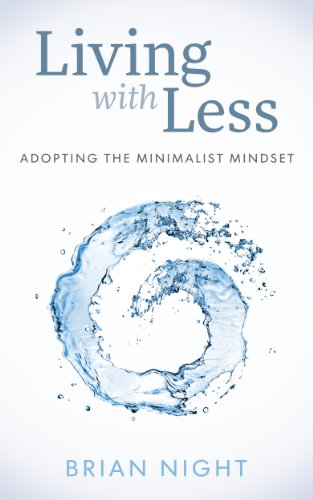“Minimalism is all about spending your time with the most valuable people and objects in your life. Things that truly add value to your life. Discovering your passions in life are very important and will help you stay focused on your way to a minimalist life. You would be surprised at how many people have gone through life without discovering their hobbies or true passions. Many minimalists have combined their budgeting with their passions and have discovered a way to make their passions a full time income. By surrounding yourself with your passions and removing distractions you will find that you are naturally looking for ways to monetize your passions” (Amazon summary).![Adopting The Minimalist Mindset: How To Live With Less, Downsize, And Get More Fulfillment From Life by [Night, Ben]](https://i0.wp.com/images-na.ssl-images-amazon.com/images/I/41ZdNICNWOL.jpg?resize=207%2C331&ssl=1)
Introduction:
- What are your priorities?
- How do these priorities compare and contrast to yours?
- How can minimalism change your lifestyle?
- What is your purpose in life and how is your acquisition of stuff keeping your from achieving it?
Chapter 1: The Mindset:
- Why is a mindset shift important for minimalism?
- How is less more?
- How can you avoid the advertising trap?
- What examples of minimalism surround you?
- How does budgeting related to minimalism?
- What logos or brands saturate your life currently?
Chapter 2: The End Game of Minimalism:
- How can you benefit from minimalism?
- How is minimalism a spiritual journey?
- How can minimalism help everyone?
Chapter 3: 15 Habits of Highly Effective Minimalists:
- Which habit would you like to employ now? Why?
- What would you add to this list?
- How does your ego impact your desires to be a minimalist?
- How can you find your best performance times?
- What is your first step on your journey to minimalism? Why?
- Since shopping and acquiring stuff adds endorphins, what can you use to replace these endorphins while practicing minimalism?
- What do you need to do to increase discipline in your life?
- What rewards motivate you?
Chapter 4: The Minimalist Kitchen
- What items in your kitchen have not been used?
- What are the pros and cons to the minimalist kitchen?
- What could you absolutely not live without?
- What could be consolidated?
- How could a minimalistic kitchen make you feel freer?
Chapter 5: The Minimalist Bathroom
- What items have cluttered your bathroom?
- How do clear surfaces epitomize minimalism?
- What is the correlation between cleanliness and minimalism?
Chapter 6: Minimalist Toys
- Do toys get out of control in your home? Why? How?
- How can adults use concentrated play time in their lives?
- Which toys add the greatest amount of work and effort to your life?
- How can you apply the add/subtract method to other aspects of your life?
Chapter 7: Minimalist Living Room
- What items in this space add stress to your life?
- What is the goal of minimalism?
Chapter 8: Minimalist Office
- How can the minimalism approach reduce stress for you in the workplace?
- How can technology aid minimalism?
- Do you agree or disagree with the author’s point of view that paper and pen is on the way out?
- What items already clutter your workspace which you deem unnecessary?
- How can you keep your desk clean at all times?
- How can you use technology to minimize clutter in your life?
- How does the wall décor clutter an office space?
Chapter 9: Minimalist Habits to Follow:
- What are your current shopping trips which clutter your lives?
- How can material belongings add value to life?
- How does peace in the present apply to minimalism?
Chapter 10: The Minimalist Budget
- How is minimalism a skill?
- What role does creativity play in minimalism?
- What is the connection between intelligence and minimalism?
- Is there a correlation between deferred gratification and a life of minimalism?
- What rewards will come to you from living a life of minimalism?
Chapter 11: Introduction to Saving on Groceries
- How does cooking aid a budget?
- How essential is the twelve week mark?
- What is the cost to benefit analysis of coupons?
- What small change can you make today to save on groceries?
Chapter 12: Cable/Internet/Video Games
- Why do you watch TV?
- What value do video games and TV add to your life?
Chapter 13: Clothing
- How can clothing be a stumbling block to a life of minimalism?
- Is there a correlation between clothing and minimalism?
- How can you use deals and clearance sales?
Chapter 14: Eating Out
- What reasons do you use for eating out?
- Does eating out add value to your life or do you use it as a convenience?
Chapter 15: Telephone Service
- Do you shop around for phone service?
- Have you recently gone through your cellphone bill?
Chapter 16: 50 Tips that will Save You Money
- What would you add to this list?
- What would you subtract from this list?
- How can you take emotions out of purchases?
Chapter 17: Final Word on Minimalist Budgeting
- Does your budget reflect what you value most?
- How can you change your budget to match what you value most?
By Tracy Harrington-Atkinson
Tracy Harrington-Atkinson, mother of six, lives in the Midwest with her husband. She is a teacher, having taught elementary school to higher education, holding degrees in elementary education, a master’s in higher education and continued on to a PhD in curriculum design. She has published several titles, including Calais: The Annals of the Hidden, Lemosa: The Annals of the Hidden, Book Two, Rachel’s 8 and Securing Your Tent. She is currently working on a non-fiction text exploring the attributes of self-directed learners: The Five Characteristics of Self-directed Learners.

Comments are closed